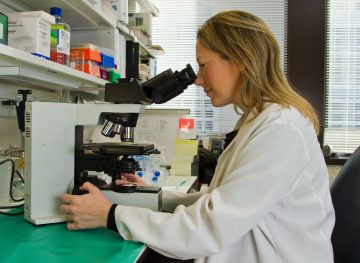
Title: Assistant Professor and Investigator
Department and Affiliations:
Department of Pediatrics
Department of Anesthesiology, Pharmacology & Therapeutics
BC Children’s Hospital Research Institute
Location: BC Children’s Hospital Research Institute
Tell us about your research and what makes you passionate about it.
Research in my lab is working to discover how our individual genetic differences can influence how likely we are to develop painful conditions, experience severe pain, and respond to different pain relievers. Our research is so exciting to us because we have the opportunity to help vulnerable populations such as children with cancer who experience high levels of pain not only from their disease but from their life-saving medications.
Is there a translational aspect of your research that you are most excited about?
Our work starts with genetic discovery and progresses to the clinical implementation of pharmacogenomic testing to help design personalized pain management strategies to optimize pain relief without harm. This translational aspect is so important because young children are often unable to communicate their levels of pain and whether their pain is relieved. Therefore, predictive genetic testing offers a way to help identify pain relievers that are most likely to be safe and effective for them.
Are there any initiatives you would like to see at UBC to accelerate translational medicine in your area of research?
As a PhD-trained scientist, I rely on developing strong collaborations with clinical colleagues in order to identify research priorities that will deliver value to patients and families. I also rely on these collaborations to translate our genetic findings into pharmacogenomic testing strategies. I would love to see more initiatives that aim to formalize/initiate these sorts of connections (e.g., matchmaking opportunities).
You are part of the Academy of Translational Medicine Early Career Researcher cohort at UBC. What is the most important aspect of that community for you?
This community provides a wonderful opportunity to present translational work to varied audiences, and to hear about the varied translational work of others, so that necessary interdisciplinary aspects can be considered to improve the quality of research outputs.
Is there a resource that you found impactful and would recommend to others interested in translational medicine?
I am fortunate to be supported by the amazing people at the Research & Technology Development Office at the BC Children’s Hospital Research Institute who have helped me immensely in both the strategic development of my research program as well as dramatically improving my research grant submissions.
How do you like to recharge outside of work?
I like to spend time with my family. Since my children are still small, this generally means spending time at the park, making crafts or having silly dance parties.








